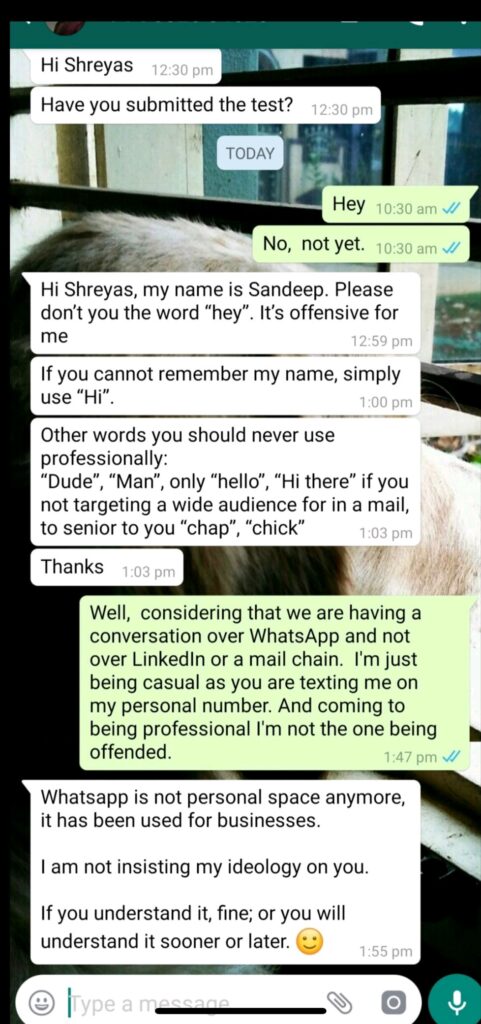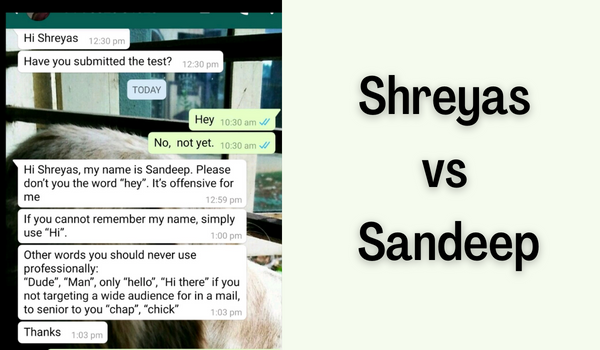A very interesting yet intriguing post is doing the rounds on social media, where a candidate and his interviewer are pulling up each other over the use of ‘Hey’ in a WhatsApp message!
What would seem like a harmless form of greeting to many apparently led to an argument between the two parties involved. The employee who starts his WhatsApp message greeting the boss with a ‘Hey’ wasn’t prepared for the boss’ reaction at all. The latter clearly took offence to the casual greeting and proceeded to explain why such language is “unprofessional”.
The language used by the new generations has definitely changed the very tone of conversations and texture of communication. HRKatha attempts to understand why language is changing and creating a divide between the ‘old-timers’ and ‘millennials’ at the workplace.
To understand what exactly happened, let’s revisit the exchange between the said boss and employee.
 The young professional recently shared his WhatsApp chat with a senior officer, who had objected to being greeted with an ‘unprofessional ‘Hey’”.
The young professional recently shared his WhatsApp chat with a senior officer, who had objected to being greeted with an ‘unprofessional ‘Hey’”.
The youngster had no idea this informal mode of greeting will become the bone of contention between the two and would draw the attention of netizens across the world.
The youngster responded to a query from the boss about a test report, with a ‘Hey’, which upset the senior who decided to school the employee on ‘professionalism’.
“Hi Shreyas, My name is Sandeep. Please don’t use the word ‘hey’,” the boss wrote, asking Shreyas to at least use a “Hi” instead of ‘Hey’. Sandeep then goes on to list out words that should not be used in professional exchanges. The list comprised, ‘Dude, ‘Man, and ‘hello’ and “Hi there” amongst others.
Shreyas of course pointed out that the conversation was a casual one taking place over WhatsApp and not over LinkedIn or a mail chain.
However, the question here is why did Sandeep get so offended with the word ‘Hey’ in the first place? After all, aren’t we all living in a world full of millennials, who are clearly ruling the roost?
Even organisations today have started encouraging more informal and friendly ways of communication, so that their employees feel good and perform better.
“Sandeep was right in contacting him as the deadline was over. In fact, it was Shreyas’ duty to inform him of his inability to complete the test for whatever reasons. But this was completely uncalled for. It puts the candidate in poor light as well.”
Ravi Mishra, VP-HR, Advance Materials Business, Aditya Birla Group
Communication today has become more flexible in comparison to the past. However, there are certain seniors at the workplace who are still stuck in time and suffering from what can be called the old-school decorum syndrome.
Hari TN, senior HR leader, says, “The use of ‘hey’ or ‘hi’ is widely acceptable now. Times are changing and so is the language and the way people address one another”. Therefore, he would not consider it as a “breach of the office decorum” at all.
Ravi Mishra, SVP-HR, Advance Materials Business, Aditya Birla Group, agrees with TN, but also adds that it all depends on the organisational culture.
Sunil Singh, CHRO, Stellar Value Chain Solutions, feels that a lot has changed in the way we communicate these days, as most of the workforce comprises youngsters. Hence, it doesn’t really matter.
“Shreyas is also in some ways Sandeep’s customer. Therefore, he should have been more thoughtful before flying off the handle”
Hari TN, senior HR leader
Who is right — Sandeep or Shreyas?
Both Hari and Singh agree that Sandeep should have shown some maturity while dealing with the youngster. He should have simply ignored the harmless greeting and moved on.
Kumar feels that both Sandeep and Shreyas had conveniently ignored the nature of the platform they were chatting on and the rank of the person they were interacting with.
The manager, who clearly belonged to the old school, must have found it difficult to adjust to the jargon used by Shreyas. But again, Sandeep should have shown some restraint.
According to Hari, “Shreyas is also in some ways Sandeep’s customer. Therefore, he should have been more thoughtful before flying off the handle.”
Mishra feels that “Sandeep taking an offense was natural because of his upbringing and cultural ethos.”
Kumar goes on to reveal that personally, when he communicates with his global HR leader, he takes his first name but when he is dealing with his Indian senior, he uses the formal way of greeting.
Singh does not think Shreyas was wrong, as “he was being approached on social-media platforms”.
“The working environment has become more open”
Sunil Singh, CHRO, Stellar Value Chain Solutions
Sandeep or anyone shouldn’t be expecting youngsters to be old school, as times have surely changed. “The working environment has become more open,” points out Singh.
Did Sandeep overreact?
All three HR leaders unanimously agree that Sandeep has overreacted.
“It would have been perfectly fine for Sandeep not to extend the deadline for the test, but it wasn’t ok to take umbrage to the use of ‘Hey’ and get upset about it,” says Hari.
Singh wonders why Sandeep waited for Shreyas to complete the test in the first place. After all, Singh points out, “Shreyas could have been looking for other options or was merely not interested in the job”.
However, Mishra has a different take on this. He says, “Sandeep was right in contacting him as the deadline was over. In fact, it was Shreyas’ duty to inform him of his inability to complete the test for whatever reasons. But this was completely uncalled for. It puts the candidate in poor light as well”.
It will not be incorrect to say that today’s leaders have to deal with youngsters with a very open mind, a humble approach and in a simple manner, unlike the earlier days, where the bosses always called the shots.
To ensure proper decorum, companies should offer training in soft skills and other creative activities, which will let the millennials differentiate between formal and informal conversations, when it comes to mails, chats and meetings. Ultimately, the answer to ‘How much is too much?’ lies in the culture of the organisations.
Value our content... contribute towards our growth. Even a small contribution a month would be of great help for us.
Since eight years, we have been serving the industry through daily news and stories. Our content is free for all and we plan to keep it that way.
Support HRKatha. Pay Here (All it takes is a minute)





































I like the interesting summary line ”.. ‘How much is too much?’ lies in the culture of the organisations.” As a student of culture working in a global culture advisory firm, I believe things can get even more interesting and complex when you throw in people of different nationalities in the mix.
I think an issue which could have been sorted out informally and effectively is made big.
Culture, yes, but the issue in question is not a huge cultural aspect requiring people to split their hair.
Both are responsible for the situation. We can’t take shelter under millennium and draw parallels like
old school and the like. According to me the problem lies somewhere and not in addressing hi .
Let the two have a heart to heart talk and am sure the outcome will be different.
I am not in the least simplifying the role of culture in an organization. But this particular incident seems to be blown out of proportion.
In a n organization i was working, on day 1 during orientation the incumbent was told irrespective of the position a person held; has to be addressed by first name to bring in informality and openness to express freely. Some found it difficult initially due to their earlier organization’s culture where this was alien; but gradually fell in place.